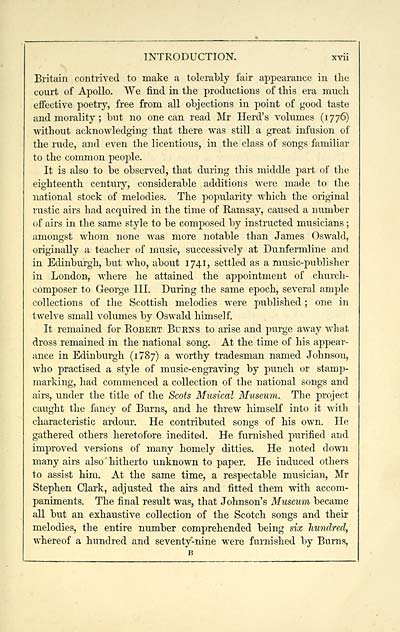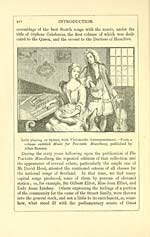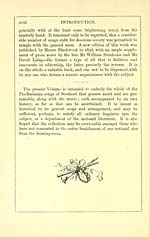Glen Collection of printed music > Printed text > Songs of Scotland prior to Burns
(21) Page xvii
Download files
Complete book:
Individual page:
Thumbnail gallery: Grid view | List view

INTRODUCTION. xvii
Britain contrived to make a tolerably fair appearance in the
court of Apollo. We find in the productions of this era much
effective poetry, free from all objections in point of good taste
and morality ; but no one can read Mr Herd's volumes (1776)
without acknowledging that there was still a great infusion of
the rude, and even the licentious, in the class of songs familiar
to the common people.
It is also to be observed, that during this middle part of the
eighteenth century, considerable additions were made to the
national stock of melodies. The popularity which the original
rustic airs had acquired in the time of Ramsay, caused a number
of airs in the same style to be composed by instructed musicians ;
amongst whom none was more notable than James Oswald,
originally a teacher of music, successively at Dunfermline and
in Edinburgh, but who, about 1741, settled as a music-publisher
in London, where he attained the appointment of church-
composer to George III. During the same epoch, several ample
collections of the Scottish melodies were published ; one in
twelve small volumes by Oswald himself.
It remained for Robert Burns to arise and purge away what
dross remained in the national song. At the time of his appear-
ance in Edinburgh (1787) a worthy tradesman named Johnson,
who practised a style of music-engraving by punch or stamp-
marking, had commenced a collection of the national songs and
airs, under the title of the Scots Musical Museum. The project
caught the fancy of Burns, and he threw himself into it with
characteristic ardour. He contributed songs of his own. He
gathered others heretofore inedited. He furnished purified and
improved versions of many homely ditties. He noted down
many airs also ' hitherto unknown to paper. He induced others
to assist him. At the same time, a respectable musician, Mr
Stephen Clark, adjusted the airs and fitted them with accom-
paniments. The final result was, that Johnson's Museum became
all but an exhaustive collection of the Scotch songs and their
melodies, the entire number comprehended being six hundred,
whereof a hundred and seventy-nine were furnished by Burns,
Britain contrived to make a tolerably fair appearance in the
court of Apollo. We find in the productions of this era much
effective poetry, free from all objections in point of good taste
and morality ; but no one can read Mr Herd's volumes (1776)
without acknowledging that there was still a great infusion of
the rude, and even the licentious, in the class of songs familiar
to the common people.
It is also to be observed, that during this middle part of the
eighteenth century, considerable additions were made to the
national stock of melodies. The popularity which the original
rustic airs had acquired in the time of Ramsay, caused a number
of airs in the same style to be composed by instructed musicians ;
amongst whom none was more notable than James Oswald,
originally a teacher of music, successively at Dunfermline and
in Edinburgh, but who, about 1741, settled as a music-publisher
in London, where he attained the appointment of church-
composer to George III. During the same epoch, several ample
collections of the Scottish melodies were published ; one in
twelve small volumes by Oswald himself.
It remained for Robert Burns to arise and purge away what
dross remained in the national song. At the time of his appear-
ance in Edinburgh (1787) a worthy tradesman named Johnson,
who practised a style of music-engraving by punch or stamp-
marking, had commenced a collection of the national songs and
airs, under the title of the Scots Musical Museum. The project
caught the fancy of Burns, and he threw himself into it with
characteristic ardour. He contributed songs of his own. He
gathered others heretofore inedited. He furnished purified and
improved versions of many homely ditties. He noted down
many airs also ' hitherto unknown to paper. He induced others
to assist him. At the same time, a respectable musician, Mr
Stephen Clark, adjusted the airs and fitted them with accom-
paniments. The final result was, that Johnson's Museum became
all but an exhaustive collection of the Scotch songs and their
melodies, the entire number comprehended being six hundred,
whereof a hundred and seventy-nine were furnished by Burns,
Set display mode to: Large image | Transcription
Images and transcriptions on this page, including medium image downloads, may be used under the Creative Commons Attribution 4.0 International Licence unless otherwise stated. ![]()
| Special collections of printed music > Glen Collection of printed music > Printed text > Songs of Scotland prior to Burns > (21) Page xvii |
|---|
| Permanent URL | https://digital.nls.uk/90575990 |
|---|
| Description | Scottish songs and music of the 18th and early 19th centuries, including music for the Highland bagpipe. These are selected items from the collection of John Glen (1833 to 1904). Also includes a few manuscripts, some treatises, and other books on the subject. |
|---|
| Description | The Glen Collection and the Inglis Collection represent mainly 18th and 19th century Scottish music, including Scottish songs. The collections of Berlioz and Verdi collected by bibliographer Cecil Hopkinson contain contemporary and later editions of the works of the two composers Berlioz and Verdi. |
|---|

